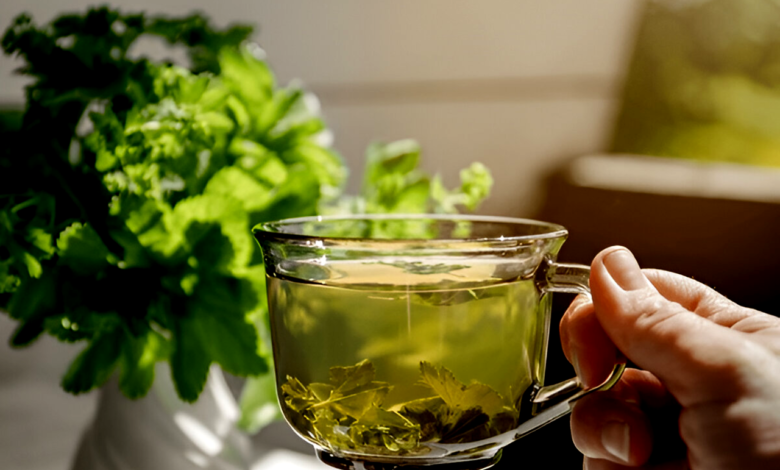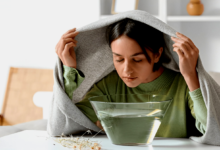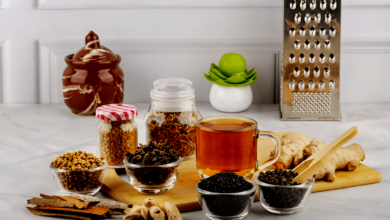The Ultimate Guide to Herbal Teas for Better Sleep
Discover the best herbal teas for better sleep from chamomile to valerian root Natural remedies for deeper more restful nights.

In today’s fast-paced world, millions struggle with sleepless nights, tossing and turning as stress and anxiety keep them awake. While sleep medications are an option, many people seek natural alternatives and herbal teas for better sleep offer a gentle, time-tested solution. For centuries, cultures around the globe have turned to soothing botanicals like chamomile, valerian root, and lavender to calm the mind, relax the body, and promote deep, restorative rest. Unlike caffeine-laden drinks, these herbal infusions work in harmony with your body’s natural rhythms, helping you unwind without harsh side effects. Whether you’re battling insomnia, stress-induced wakefulness, or simply looking for a relaxing bedtime ritual, this guide will introduce you to the most effective sleep-inducing teas and how to use them.
The beauty of herbal teas for better sleep lies in their simplicity and accessibility. A warm cup before bed not only hydrates but also signals your nervous system to slow down, preparing you for a night of uninterrupted slumber. From ancient remedies to modern scientific backing, these teas have stood the test of time as reliable sleep aids. In this comprehensive guide, we’ll explore the best herbs for sleep, their unique benefits, and how to brew them for maximum effectiveness. Say goodbye to restless nights and hello to a natural, soothing path to better sleep.
The Ultimate Guide to Herbal Teas for Better Sleep
The Science Behind Herbal Teas and Sleep
Herbal teas have been used for centuries as natural sleep aids, and modern research supports their effectiveness. Unlike caffeinated beverages, herbal infusions contain compounds that interact with the nervous system to promote relaxation. Ingredients like chamomile, valerian root, and lavender work by increasing GABA (gamma-aminobutyric acid), a neurotransmitter that calms brain activity. Other herbs, such as passionflower and lemon balm, reduce cortisol levels, the stress hormone that disrupts sleep. By incorporating these botanicals into your nightly routine, you can create a natural, drug-free way to enhance sleep quality.
Top Herbal Teas for Better Sleep
Chamomile Tea
Chamomile is one of the most well-known herbal teas for better sleep, prized for its mild sedative effects. Studies suggest that apigenin, an antioxidant in chamomile, binds to brain receptors that reduce anxiety and initiate sleep. Drinking a warm cup before bed can ease tension and improve sleep duration.
Valerian Root Tea
Valerian root has been used since ancient times to treat insomnia. Research indicates that it increases GABA levels, helping the mind and body relax. While its earthy taste may be strong for some, blending it with honey or mint can make it more palatable.
Lavender Tea
Natural Relaxant for Mind and Body
Lavender tea contains active compounds like linalool and linalyl acetate, which interact with the nervous system to promote relaxation. These components help reduce anxiety and quiet racing thoughts, making it easier to transition into deep, restful sleep. The gentle floral flavor, often enhanced with a touch of honey, creates a comforting bedtime ritual that signals the body to unwind.
Physiological Benefits for Deeper Sleep
Studies show that lavender tea can lower cortisol levels (the stress hormone) while simultaneously reducing heart rate and blood pressure. This dual effect mimics the body’s natural wind-down process, easing tension in muscles and encouraging slower, steadier breathing. Unlike sedatives, lavender works gently without causing grogginess, making it ideal for those who struggle with nighttime restlessness or intermittent waking.
Passionflower Tea
Passionflower is particularly effective for those whose sleeplessness stems from anxiety. It boosts Gamma-aminobutyric acid (GABA) production, quieting an overactive mind. Many find it helpful for reducing nighttime awakenings.
Lemon Balm Tea
A member of the mint family, lemon balm has a gentle citrusy flavor and mild sedative effects. It combats restlessness and promotes a deeper, more uninterrupted sleep cycle.
How to Prepare Herbal Teas for Maximum Benefits
To get the most out of herbal teas for better sleep, proper preparation is essential. Always use fresh, filtered water and steep herbs for at least 5-10 minutes to extract their full benefits. Covering the cup while steeping helps retain volatile oils that enhance relaxation. Adding a teaspoon of raw honey can improve taste while also supporting sleep due to its natural sugar-stabilizing effects.
Additional Tips for Enhancing Sleep with Herbal Teas
Create a Consistent Wind-Down Routine
Pair your herbal tea ritual with other relaxing activities like light stretching, reading a book, or meditation to strengthen your body’s sleep signals. Going to bed and waking up at consistent times even on weekends helps regulate your circadian rhythm, making it easier to fall asleep naturally. The combination of herbal teas and routine trains your brain to associate these habits with sleep onset.
Optimize Your Sleep Environment
Maximize the benefits of sleep-inducing teas by eliminating sleep disruptors: reduce screen time 1–2 hours before bed (blue light blocks melatonin), keep your bedroom between 60–67°F (15–19°C) for ideal sleep temperature, and use blackout curtains or a sleep mask. Adding white noise or earplugs can neutralize distracting sounds, while breathable cotton bedding enhances comfort. These adjustments work synergistically with herbal teas to deepen sleep quality.
Potential Side Effects and Considerations
Though generally safe, some herbs may interact with medications or cause mild side effects. Valerian root, for example, should not be mixed with sedatives, and excessive chamomile intake may trigger allergies in those sensitive to ragweed. Pregnant or nursing women should consult a doctor before trying new herbal remedies. Starting with small doses helps gauge individual tolerance.
Read More: Fitness Tracker Showdown Which One is Worth It in 2025?
Conclusion
Incorporating herbal teas for better sleep into your nightly routine can be a transformative step toward achieving restful, rejuvenating slumber. These natural remedies offer a gentle yet effective way to calm the mind, relax the body, and ease into deep sleep without the side effects of pharmaceutical sleep aids. Whether you choose chamomile for its mild sedative properties, valerian root for its GABA-boosting effects, or lavender for its soothing aroma, each herb brings unique benefits to your bedtime ritual. By making these teas a consistent part of your evening, you create a comforting habit that signals to your body it’s time to unwind and prepare for restorative rest.
Ultimately, the power of herbal teas for better sleep lies in their ability to work holistically with your body’s natural rhythms. While they can significantly improve sleep quality, their benefits are best realized when paired with healthy sleep hygiene such as limiting screen time before bed, maintaining a regular sleep schedule, and creating a peaceful bedroom environment. Experiment with different blends to discover which herbs resonate most with you, and enjoy the journey toward more peaceful nights and energized mornings. With patience and consistency, these time-honored remedies can help you reclaim the deep, uninterrupted sleep your body deserves. Sweet dreams await.
FAQs
Which herbal tea is best for deep sleep?
Valerian root and chamomile are among the most effective for inducing deep, uninterrupted sleep.
How long before bed should I drink herbal tea?
For best results, consume your tea 30-60 minutes before bedtime to allow relaxation to set in.
Can I mix different herbal teas for sleep?
Yes! Blending chamomile, lavender, and lemon balm can enhance their calming effects.
Are there any side effects of sleep-inducing herbal teas?
Most are safe, but some people may experience drowsiness, digestive discomfort, or allergies.
Can children drink herbal teas for sleep?
Mild options like chamomile are generally safe but consult a pediatrician first.










